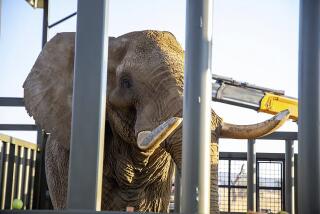Abandoned Elephant Finds Mother Outside the Box
- Share via
HOEDSPRUIT, South Africa — They are an improbable couple as they amble side-by-side down a dusty lane.
Mother and adopted son are both four-legged herbivores, but their similarities end there. Abandoned by his biological mother in the wild, Jabulani, a 2-year-old elephant, has found a most unlikely maternal figure in Skaap, a female sheep.
“Skaap is very good with young wild animals,” said Lente Roode, the owner and director of the Hoedspruit Breeding and Research Center for Endangered Species. “When we bring an orphaned or injured animal from the wild to here they are very stressed. Skaap has a calming influence on them.”
Skaap, whose name is Afrikaans for sheep, has forged a special bond with Jabulani, who was brought to the center as an infant almost two years ago.
“He was stuck in the mud at Phalaborwa, a game reserve run by a mining company,” Roode said. “We pulled him out and waited for his mother to return, but she didn’t, so we brought him here. And Skaap has been with Jabulani since day one.”
The pair are inseparable, spending virtually every waking minute together. “She’s always there and she’s always friendly, even if he pushes her,” Roode said.
Jabulani, whose name is Zulu for happy, has three full-time human keepers feed the 550-pound animal his milk--every three hours, because he is a rapidly growing boy.
Skaap has helped soothe the nerves of a variety of orphaned animals, including white rhinos and water buffalo.
Large herbivores were not the center’s specialty when Roode began setting it up in 1988. Its initial focus was on breeding and preservation of the world’s fastest mammal--the cheetah.
“I had a pet cheetah when I was a girl growing up on a farm and I’ve loved them ever since,” she said as she stroked one of her big cats. She is especially proud of her clan of rare king cheetahs, which are not a separate species but have a recessive gene that produces striking black horizontal stripes along the animal’s back instead of the usual spots.
The privately run center in northern South Africa near Kruger National Park also has a pack of ferocious wild dogs, only a few hundred of which remain in the wild. Feathered inhabitants include three injured white storks and some ground hornbills, which have been pushed to the brink of extinction.
The center also boasts what Roode calls her “vulture restaurant,” a shallow pit where the carcasses of animals that die or are culled in nearby game parks are left to rot in the sun and feed the local population of vultures.
Many of the animals brought to or born in the center are eventually set free. Roode hopes to release Jabulani early next year in the neighboring Kapama game reserve, a 32,000-acre park that has a herd of more than 20 elephants.
“We hope the herd will adopt Jabulani. Experts have told me that there is a 90% chance that they will take him in,” she said. But his human keepers and Skaap will go into the bush with him to see him off, just in case the herd rejects him.
If it accepts him, Roode has no doubt the parting of sheep and elephant will be a sad farewell. But there will be other motherless elephants for Skaap to work her maternal magic on.
More to Read
Sign up for Essential California
The most important California stories and recommendations in your inbox every morning.
You may occasionally receive promotional content from the Los Angeles Times.












